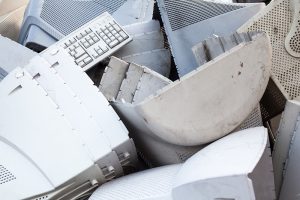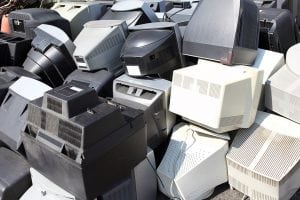 A plastics compounder has introduced a line of engineering-grade pellets, including some plastic types used in electronic devices, that contain up to 50% recycled content.
A plastics compounder has introduced a line of engineering-grade pellets, including some plastic types used in electronic devices, that contain up to 50% recycled content.

 A plastics compounder has introduced a line of engineering-grade pellets, including some plastic types used in electronic devices, that contain up to 50% recycled content.
A plastics compounder has introduced a line of engineering-grade pellets, including some plastic types used in electronic devices, that contain up to 50% recycled content.

Brian Riise on stage at the 2019 Plastics Recycling Conference and Trade Show.
An expert recently explained why North American e-plastics processing could be a component of a wider effort to reduce energy use in U.S. manufacturing. And he outlined steps for progress.
 Researchers overseas say high-impact polystyrene from scrap electronics can be used as a replacement for sand in self-compacting concrete.
Researchers overseas say high-impact polystyrene from scrap electronics can be used as a replacement for sand in self-compacting concrete.
 Import policies in China and Southeast Asia continue to tighten, making it more difficult to move certain e-scrap materials to international markets.
Import policies in China and Southeast Asia continue to tighten, making it more difficult to move certain e-scrap materials to international markets.
 A major e-scrap processor that was recently called out by the Basel Action Network for improper export activities has questioned the watchdog’s allegations.
A major e-scrap processor that was recently called out by the Basel Action Network for improper export activities has questioned the watchdog’s allegations.
 A year after an online scrap plastics trading marketplace launched, an executive at the startup offered insight into where material is moving in the aftermath of China’s ban on certain recovered materials.
A year after an online scrap plastics trading marketplace launched, an executive at the startup offered insight into where material is moving in the aftermath of China’s ban on certain recovered materials.
 A draft European Union law limits traces of a flame retardant in products to such a low level that it would effectively kill e-plastics recycling on the continent, two industry groups said.
A draft European Union law limits traces of a flame retardant in products to such a low level that it would effectively kill e-plastics recycling on the continent, two industry groups said.
 A Norwegian proposal that aims to combat marine debris could close the door to e-plastics export markets for U.S. processors.
A Norwegian proposal that aims to combat marine debris could close the door to e-plastics export markets for U.S. processors.
 Major electronics manufacturers Dell and HP recently released their yearly corporate sustainability reports, showing their achievements in material sourcing, design for repair and closed-loop recovery.
Major electronics manufacturers Dell and HP recently released their yearly corporate sustainability reports, showing their achievements in material sourcing, design for repair and closed-loop recovery.
